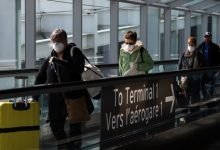Coronavirus: What’s happening in Canada and around the world Monday
Canadian businesses and non-profit organizations that see a drop of at least 30 per cent in revenue due to COVID-19 will qualify for the government’s 75 per cent wage subsidy program, Prime Minister Justin Trudeau announced on Monday. The number of employees will not be a factor in eligibility for the subsidy, Trudeau said at his daily media briefing outside his Rideau Cottage residence.
That reassurance came after Canada’s chief public health officer, Dr. Theresa Tam, urged Canadians over the weekend to “stay strong” and not let up on measures like physical distancing and proper hand hygiene, saying it will be a critical week in the fight against COVID-19’s spread.
It was confirmed as the week began that Newfoundland and Labrador had recorded its first death due to the novel coronavirus. The patient — a retired man in the Eastern Health region — died Sunday, about three days after being hospitalized.
In eastern Ontario, meanwhile, nine residents of a long-term care facility have died of COVID-19 complications since early last week, and the facility’s medical director said Monday they are all believed to be linked to the virus. CBC Toronto previously reported that nearly three dozen staff members at Pinecrest Nursing Home in Bobcaygeon, Ont., have experienced COVID-19 symptoms.
Across Canada, a domestic travel ban for those showing symptoms goes into effect Monday.
The pandemic has countries scrambling to contain the spread of the virus and quickly scale up health systems struggling with a shortage of protective gear. Governments are also trying to tackle the economic fallout that has accompanied the pandemic as many businesses cut jobs, scale back operations or close.
The novel coronavirus, which first emerged in China in late 2019, causes mild or moderate symptoms for most people. Health officials have said older people and those with underlying health issues are most at risk of severe disease and death, but they caution that younger people can also develop serious illness.
Read on for a look at what’s happening in Canada, the U.S. and some other hard-hit areas.
Here’s what’s happening in the provinces and territories
As of 12:30 p.m. Monday, Canada’s provinces and territories reported more than 6,680 confirmed and presumptive COVID-19 cases, though public health officials have cautioned that those numbers don’t capture the full picture. That’s because there are people who haven’t been tested, people who are being investigated as possible cases, and people who are still waiting for results. A total of 1,014 cases have been listed as recovered or resolved.
There have been 67 COVID-19 deaths reported in Canada. There have also been two COVID-19-related deaths of Canadians abroad — one in Japan and one in Brazil.
In Ontario, CBC Toronto has obtained copies of COVID-19 reports issued daily by Critical Care Services Ontario, a branch of the province’s Ministry of Health. The latest report, from Saturday, shows 92 patients in critical-care wards have tested positive for COVID-19, while another 342 ICU patients are considered “suspected” cases.
This means confirmed or suspected COVID-19 cases now account for roughly one out of every four patients currently in Ontario’s intensive care units — the first crucial medical resource to be overwhelmed by the spread of the virus in Italy, Spain and New York City.
The Quebec government announced $113 million in emergency funds Monday for seniors’ residences, while a Hasidic Jewish community is seeking help from officials following a spike in COVID-19 cases. Still, on Sunday, Premier François Legault said the province appears to be “stabilizing” as the rate of new cases per day has dropped.
Following two years of catastrophic flooding, COVID-19 border closures and physical distancing rules are the latest threats to New Brunswick farmers. Questions over how foreign workers will enter Canada and how long they will have to self-isolate are especially worrying, while the president of the Agricultural Alliance of New Brunswick is asking for the entire food-supply chain to be declared an essential service in order to protect the industry.
Prince Edward Island’s businesses and health resources are being forced to adapt as COVID-19 changes islanders’ needs, and buying habits. Internet providers are reporting an uptick in demand, mental health and addictions support have moved online and rural grocery stores are experiencing significantly higher volumes as people attempt to shop local.

Teachers in British Columbia are back on the job Monday, working on plans to teach students from home. To that end, on Friday the province launched a new education resource website for caregivers, who will likely be helping with their child’s education for the remainder of the school year. Also over the weekend, grocery stores were told they should not allow customers to use their own reusable bags, and the B.C. government announced it is sending $3 million in emergency funding to the province’s food banks, which are facing an increase in demand as people struggle to make ends meet.
In Alberta, some people applying for a provincial one-time funding program meant to tide them over until federal supports are in place are having problems with the process. “It’s absolutely frustrating and I really do need it,” said one self-employed worker who is trying to access the Emergency Isolation Support program.
The chief medical health officer of the Saskatchewan Health Authority issued a call to the public over the weekend: “I never thought I’d see the day when people physically avoiding each other was a positive development. It’s not just positive right now, it’s absolutely necessary,” said a letter from Dr. Susan Shaw.
“We’ve had it.” That was the message from Nova Scotia’s premier to what he called the “reckless few” who are not following public health rules in the province. Premier Stephen McNeil said that enforcement had to be stepped up because of rule breakers.
Manitoba’s top doctor says so far all the cases recorded in the province are linked to travel, or to close contact with someone who tested positive for COVID-19. Dr. Brent Roussin said over the weekend that Manitoba is working toward finding a way to report the rate of increase, which would help indicate “what’s flattening our curve or not.”
Here’s what’s happening in the United States
From The Associated Press, updated at 5 a.m. ET
U.S. President Donald Trump, who just last week said he hoped the country would be “opened up and just raring to go” by Easter, said on Sunday that the physical distancing guidelines would be in place until at least April 30 to slow the spread of COVID-19.
The United States has the most recorded cases of the novel coronavirus of any country in the world, followed by Italy and now Spain, which surpassed China’s official case count on Monday. The Spanish health ministry reported more than 85,000 cases, with 7,340 deaths.

Dr. Anthony Fauci, the U.S. government’s top infectious disease expert, said the decision to extend the federal guidelines — which advise against social gatherings and urge people at higher risk of developing severe illness to stay home — was a “wise and prudent” move given the projections for case numbers if mitigation efforts aren’t strong enough.
New York state surpassed a grim milestone Sunday as its death toll from the coronavirus outbreak climbed above 1,000, less than a month after the first case was detected in the state.
The total number of statewide deaths isn’t expected to be released until Monday, but with at least 250 additional deaths recorded outside the city as of Sunday morning, the state’s total fatalities was at least 1,026.
Among those dying from coronavirus complications in the U.S. were musicians Joe Diffie, a country star in the 1990s, and Alan Merrill, who co-wrote the smash Joan Jett made famous, I Love Rock ‘N Roll. Acclaimed singer-songwriter John Prine was said to be in critical condition.
Here’s what’s happening in Europe
From Reuters and The Associated Press, updated at 12:45 p.m. ET
Italy reported its total number of coronavirus cases has surpassed 100,000, reaching 101,739 on Monday. The country has also registered more COVID-19- related deaths than anywhere else in the world with 11,591 people killed, accounting for about one-third of the global death toll.
Spain’s total number of coronavirus cases rose to 85,195 on Monday as the infections surpassed those reported in China, at 81,470, according to the latest data. Some 12,298 Spanish health workers have tested positive, deputy health emergency chief Maria Jose Sierra said Monday. The death toll from the virus in Spain rose to 7,340 on Monday from 6,528 on Sunday, the health ministry said.
Spain and Italy account more than half of the known 34,800 deaths worldwide from the disease.
In France, army helicopters transported COVID-19 patients fighting for their lives from the eastern part of the country to hospitals in Germany and Switzerland as French authorities battle to free up space in life-support units. The Grand Est region was the first in France to be overwhelmed by a wave of infections that has rapidly moved west to engulf the greater Paris region, where hospitals are desperately adding intensive care beds to cope with the influx.
The number of confirmed cases in Germany has risen to 57,298 and 455 people have died of the disease. Cases rose by 4,751, compared with the previous day, while the death toll climbed by 66.
Hungary’s parliament on Monday approved a bill giving Prime Minister Viktor Orban’s government extraordinary powers during the coronavirus pandemic. The bill was approved by Orban’s Fidesz party and other government supporters, but is being criticized by opposition parties, international institutions and civic groups for failing include an expiration date for the government’s ability to rule by decree.
In Britain, Prime Minister Boris Johnson is warning in a letter to 30 million households that things will get worse before they get better, as he self-isolates in Downing Street to recover from the coronavirus. Johnson’s chief adviser, Dominic Cummings, is the latest senior government figure to show symptoms of the coronavirus, which are described as mild. Britain has reported 17,089 confirmed cases of the disease and 1,019 deaths and the peak of the epidemic in the country is expected to come in a few weeks.
Meanwhile, a spokesperson for Prince Charles, 71, says the Prince of Wales is in good health and out of self-isolation after consulting with his doctor.
Here’s what’s happening in the rest of the world
From The Associated Press and Reuters, updated at 12 p.m. ET
China’s National Health Commission on Monday reported 31 new COVID-19 cases, among them just one domestic infection, while the others were individuals recently arrived from abroad.
The country is now easing the last of the controls that confined tens of millions of people to their homes while they sought to contain the spread of the virus. At the peak of China’s restrictions, some 700 million people were in areas covered by orders or official requests to stay home and limit activity.
Shopkeepers in Wuhan — the city where China’s virus outbreak began — were reopening Monday, but customers were scarce.
The focus of China’s prevention measures has shifted to overseas arrivals, with virtually all foreigners barred from entering the country starting Saturday.
South Korea has reported 78 new cases of the coronavirus and six more deaths, bringing its totals to 9,661 infections and 158 fatalities. Starting Wednesday the country will enforce two-week quarantines for all passengers arriving from overseas as authorities scramble to prevent the virus from re-entering amid broadening outbreaks in Europe, North America and beyond.
Iranian state-run media say prisoners in southern Iran broke cameras and caused other damage during a riot. It’s the latest in a series of violent prison disturbances in the country, which is battling the most severe coronavirus outbreak in the Middle East. Iran had temporarily released around 100,000 prisoners as part of measures taken to contain the pandemic, leaving an estimated 50,000 people behind bars, including violent offenders and so-called “security cases,” often dual nationals and others with Western ties. Iran has reported more than 38,000 infections and 2,640 deaths from COVID-19, the illness caused by the coronavirus.
In India, a lockdown covering the country’s 1.3 billion people has put untold numbers out of work and left many families struggling to feed themselves. Tens of thousands in New Delhi were forced to flee their homes, with no way to pay the rent, journeying back to their native villages. Women in saris held babies on their hips. Others toted their belongings in bags normally used for cement. Prime Minister Narendra Modi apologized for the hardships but said, “These tough measures were needed to win this battle.”
Indonesian President Joko Widodo said on Monday he planned stricter rules on mobility and physical distancing as a study presented to the government warned of a risk of more than 140,000 coronavirus deaths by May without tougher action.
Medical experts have said the world’s fourth-most populous country must impose tighter movement restrictions as known cases of the highly infectious respiratory illness have gone from zero in early March to 1,414, with 122 deaths, nearly half of the 250 deaths reported from across Southeast Asia.
In Israel, the prime minister’s office said Benjamin Netanyahu will go into quarantine after his adviser for parliamentary affairs, Rivka Paluch, tested positive. More than 4,300 Israelis have been infected with the virus and 15 have died.
Finally, Olympic organizers wasted no time in announcing a new date for the 2020 Tokyo Games, which were postponed last week after countries like Canada said they would not participate due to the coronavirus risk. The targeted date is now July 23-Aug. 8, 2021.
CBC








Redes Sociais - Comentários